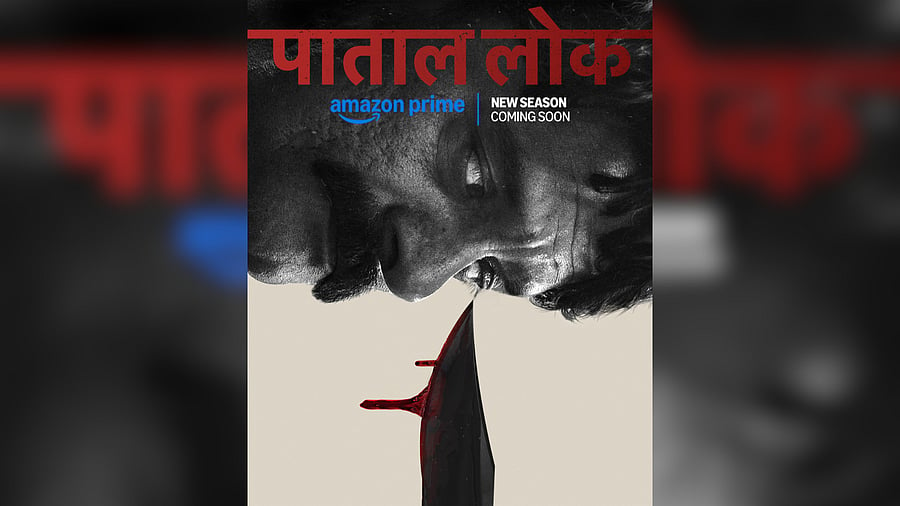
'Paatal Lok' season 2 poster.
Credit: X/@PrimeVideoIN
In the landscape of contemporary Indian cinema, OTT platforms have become a vital space for bold, intellectual storytelling, offering audiences the opportunity to experience cinema as an art form rather than mere entertainment. For too long, mainstream Hindi cinema—along with its regional counterparts—has shied away from confronting the social responsibilities of filmmakers. Stories that critically engage with socio-political realities remain rare, as the industry often focuses on spectacle, melodrama, and sensational narratives. Yet, there is a growing appetite for films and series that offer deeper, more thought-provoking inquiry. Paatal Lok 2 does just that, delivering a gripping crime thriller that impresses not only with its rich performances and stunning screenplay but also with its sharp social critique.
Hollywood has long explored the intersection of crime, capitalism, and politics, from Chinatown (1974) to L.A. Confidential (1997) to Erin Brockovich (2000). In contrast, mainstream Hindi cinema has offered few comparable nuanced storytelling—Shanghai (2012) being a notable exception. Paatal Lok 2 firmly establishes itself within this tradition, offering a complex exploration of crime, class, and politics that resonates with today’s socio-political climate. Its outstanding performances, moral depth, and intricate narrative make it a standout in the crime thriller genre.
At the heart of the series is Jaideep Ahlawat’s remarkable performance as Hathiram Chaudhary, the gritty, morally conflicted cop. This season presents a more complex side of Hathiram, one that embraces his Jaat identity with newfound audacity while retaining his humanity. He’s a loving husband, a dedicated father, and a man of moral conviction. Ahlawat’s performance is both physically and emotionally grounded: his bulk, ragged attire, and raw tone make him a convincing presence. His character arc culminates in a quietly powerful moment in the final episode, where a fleeting smile reveals the weight of his journey through violence, corruption, and betrayal.
Another significant achievement of Paatal Lok 2 is its portrayal of Nagaland—a region rarely given centrality in mainstream Hindi cinema. The show immerses viewers in the region’s breathtaking landscapes, the sounds of the Naga language, and its complex socio-political realities. Rather than reducing Nagaland and its people to exotic backdrops or stereotypes, the series presents them as fully realised characters with dignity, aspirations, and a rich cultural life. This is particularly evident in the nuanced depiction of women characters, especially Tilotama Shome’s portrayal of SP Meghna Barua, who is integral to the narrative rather than a mere plot device.
The series excels in its dual narrative structure, weaving together two separate investigations—one into the murder of a prominent Naga leader and the other into the disappearance of a Dalit daily wage labourer in Delhi. As these storylines converge, Paatal Lok 2 exposes the hidden connections between disparate lives, underscoring themes of betrayal, class struggle, and the human condition. This season moves away from the formulaic, preachy rhetoric of its predecessor, opting instead for a more existential exploration of how individuals navigate a corrupt and hostile world with a deep sense of powerlessness. Paatal Lok is not some fictional dark hell; its torturous and painful realities exist within the living world.
What stands out in Paatal Lok 2 is its commitment to foregrounding subaltern voices—Dalits, Adivasis, religious minorities, and backward classes. Unlike most mainstream Hindi films, which typically centre on upper-caste protagonists or villains, Paatal Lok 2 positions characters from marginalised communities as key functionaries. Especially, the subplot about a Dalit character is heart-wrenching. Even the protagonist, Hathiram, stands apart from typical Bollywood heroes with his lower-middle-class background, secular values, and reluctance to conform to populist tropes. This is a welcome shift towards representing the complexities of India’s social fabric in a way that resonates with the social experiences and aspirations of subaltern folks.
That said, the series leaves some characters, particularly Daniel (played by Prashant Tamang), underexplored. While their potential for deeper development is evident, certain characters, like Renu Chaudhary, Hathiram’s wife (Gul Panag), are relegated to brief appearances. However, this is a minor critique in an otherwise impressive series.
Paatal Lok 2 shall be celebrated as a brave attempt at repositioning the idea of responsible cinematic art. Director Avinash Arun has crafted a work that is both an exciting crime thriller and a sharp social commentary. Paatal Lok 2 succeeds in offering a layered, nuanced exploration of India’s socio-political realities without sacrificing its entertainment value.
(The writer is an assistant
professor at the Centre for Political Studies, School of Social Sciences in JNU, New Delhi)